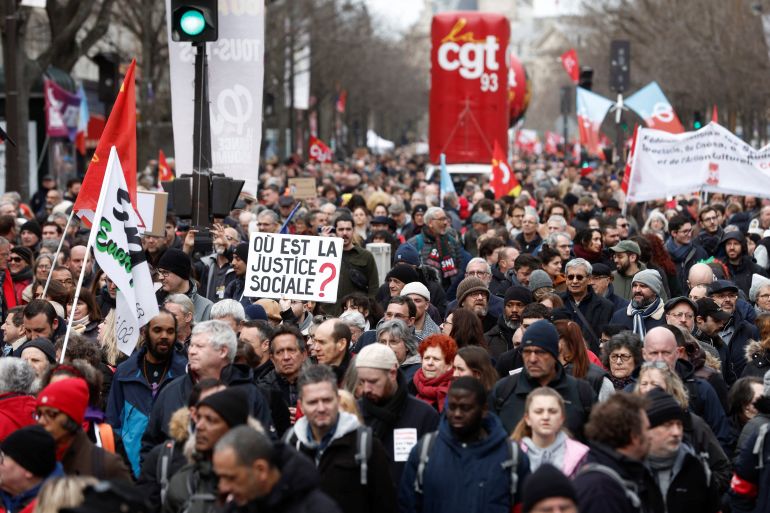French Senate approves Macron’s pension plan amid new protests
French unions call for an additional day of nationwide strikes and protests as Senate vote brings pension plan closer to becoming law.

The French Senate has approved President Emmanuel Macron’s unpopular pension reform plan as hundreds of thousands of protesters rallied in cities across the country to oppose the changes.
Senators voted late on Saturday to adopt the reforms by 195 votes to 112, bringing the package — whose key measure is raising the retirement age by two years to 64 — closer to becoming law.
“After hundreds of hours of discussions, the Senate adopted the pension reform plan. It is a key step to make a reform happen that will guarantee the future of our pension system,” Prime Minister Elisabeth Borne wrote on Twitter.
She added she was “totally committed to ensure the text will be definitively adopted in the coming days”.
Now that the Senate has adopted the bill, it will be reviewed by a joint committee of lower and upper house legislators, probably on Wednesday.
If the committee agrees on a text, a final vote in both chambers is likely to take place on Thursday. But the outcome of that still seems uncertain in the lower chamber, the National Assembly, where Macron’s party needs allies’ votes for a majority.
If the government fears it will not have enough votes in the lower house, it is still possible for it to push the text through without a parliamentary vote via a rarely used and highly controversial constitutional tool known as article 49:3.
Unions, which have fiercely opposed the measures, still hoped on Saturday to force Macron to back down, though the day’s protests against the reform were far smaller than some previous ones.
According to figures from the interior ministry, 368,000 demonstrators marched through various cities on Saturday. Authorities had expected up to a million people to take part after a record 1.28 million people rallied in the streets earlier in the week.
Tensions flared on Saturday evening, with Paris police saying they had made 32 arrests after some protesters threw objects at security forces, with rubbish bins burned and windows broken.
In a joint statement, the French unions, maintaining a rare show of unity since the protest movement was launched at the end of January, called on the government to organise a “citizens’ consultation” as soon as possible.
The unions said they plan to keep up the pressure with an additional day of nationwide strikes and protests planned for Wednesday.
“This is the final stretch,” Marylise Leon, deputy leader of the CFDT union, told the broadcaster Franceinfo. “A lot of things can still happen next week,” she said. “Will the text be voted in the National Assembly? We have to rally. It’s now or never.”
Opinion polls show a majority of voters oppose Macron’s plan, while a slim majority supports the strike actions. Most people, however, said they believe the president would end up getting the reform adopted.
The government insists the reform plan is essential to ensure the French pension system does not run out of money, but many see the changes, such as raising the retirement age, as unfair to people who started working young.
“I’m here to fight for my colleagues and for our young people,” said Claude Jeanvoine, 63, a retired train driver demonstrating in Strasbourg, in eastern France.
“People shouldn’t let the government get away with this, this is about the future of their children and grandchildren,” he told the AFP news agency.
The reforms would also increase the number of years people have to make contributions in order to receive a full pension. Protesters say that women, especially mothers, are also at a disadvantage under the new reforms.
“If I’d known this was coming, I wouldn’t have stopped working to look after my kids when they were small,” said Sophie Merle, a 50-year-old childcare provider in the southern city of Marseille.
Rolling strikes
The protests and rolling strikes have affected several sectors of the French economy, including rail and air transport, power stations, natural gas terminals and rubbish collection.
A spokesperson for TotalEnergies said that strikes continue in the oil producer’s French refineries and depots, while public railway operator SNCF said national and regional services would remain heavily disrupted over the weekend.
In Paris, garbage continues to pile up on the streets, with residents seeing a growing presence of rats, according to local media.
National power production in France was reduced by 7.1 gigawatts, or 14 percent, at nuclear, thermal and hydropower plants on Saturday due to the strikes, a CGT union spokesperson told the Reuters news agency.
Maintenance was also blocked at six French nuclear reactors, including Penly 1, the spokesperson said.
Despite the protests and strikes, Macron this week twice turned down urgent calls by unions to meet with him in a last-ditch attempt to get him to change his mind.
The snub made unions “very angry”, said Philippe Martinez, boss of the left-wing CGT union.
“When there are millions of people in the streets, when there are strikes and all we get from the other side is silence, people wonder: What more do we need to do to be heard?” he said, calling for a referendum on the pensions reform.
-al jazeera






